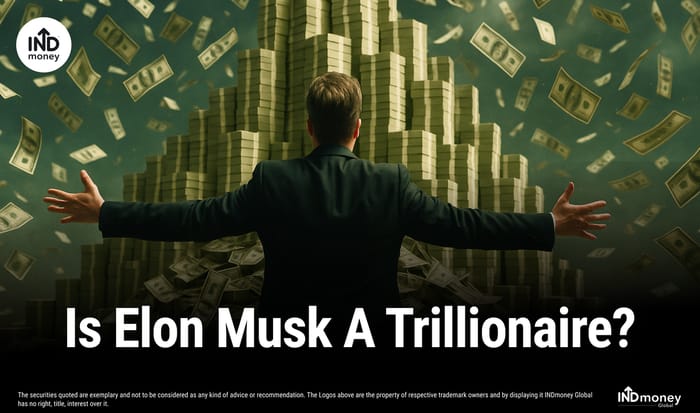
- Why is Elon Musk’s Net Worth a Mystery?
- Why Was the US$1 Trillion Pay Package Approved by Tesla for Musk?
- Why Do People Trust Elon Musk So Much?
- Final Thoughts for Investors
It is tempting to think of wealth as a static scoreboard: a number that goes up, maybe ticks down, but mostly just sums up past success. With Elon Musk, though, that scoreboard is more like a Swiss-cheese money graph: massive holes, sudden surges, and a few “wow” moments that leave you blinking.
At one moment he even crossed the half-trillion-dollar mark, then dropped back; but still remains the richest person on the planet. The story of Musk’s net worth isn’t just about how much he has, but why the number is so difficult to pin down and why investors around the world keep watching it.
Let’s break down with this blog how Musk amassed his wealth, why it remains mysterious, and why everyone puts their trust in Musk.
Why is Elon Musk’s Net Worth a Mystery?
First off: Musk’s wealth swings wildly. For instance, according to the Forbes Real-Time Billionaires list, his net worth stood at about US$491.4 billion in November 2025. Earlier in the year he briefly became the first person ever to cross the US$500 billion mark.
Why the fluctuation?
- Much of his wealth is tied to his stakes in publicly traded companies (notably Tesla, Inc.) and private holdings (such as SpaceX). When Tesla’s stock or expectations around SpaceX shift, so does his fortune.
- The approved compensation plan from Tesla (more on that below) adds further complexity: it’s an enormous potential payout but tied to many performance targets, meaning the eventual realised sum is uncertain.
- Country, tax and private valuation issues also make it harder to nail a precise number: valuations of private companies like SpaceX or his AI startup xAI are not fully transparent.
Why Was the US$1 Trillion Pay Package Approved by Tesla for Musk?
In early November 2025 Tesla shareholders approved a mammoth compensation plan for Musk worth up to US$1 trillion if all milestones are met.
Key features of the package are:
- It’s structured into tranches with ambitious goals: Tesla reaching a market cap of US$8.5 trillion, producing ~20 million vehicles, deploying ~1 million robotaxis, selling millions of humanoid robots, etc.
- Musk’s voting stake could rise from his present ~12-15 % to ~25 % if targets are met.
Why did shareholders approve this? Because:
- Many believe Musk is essential to Tesla’s future. His reputation for pushing innovation (EVs, space, robotics) means investors expect him to stay engaged.
- The compensation is performance-linked; no salary upfront, only if targets are hit. That aligns Musk’s interests with shareholders at least in theory.
- For global investors the logic is: if Tesla becomes not just an EV company but also a robotics/AI platform, then Musk's upside is massive and his compensation may just reflect that future.
That said: the size of the package raises governance and dilution questions. It also means Musk’s net-worth could go even higher but only if Tesla delivers extraordinary growth.
Why Do People Trust Elon Musk So Much?
What sets Musk apart in the investor psyche? Partly it’s his track record of turning bold ideas into companies that matter. A few examples:
- SpaceX: Founded in 2002, it overcame repeated failures and became the first private company to send astronauts into orbit.
- Tesla: At times deeply challenged with production bottlenecks, criticism, competition, but it established itself as the market leader in EVs and now has extended into energy storage and software.
- Neuralink, The Boring Company, xAI: each venture signals that Musk is not just content with one “hit”; he is attempting to build a platform of futuristic businesses.
For global investors, the takeaway is clear: His value proposition isn’t just wealth, it’s “visionary entrepreneur who can execute.” That tends to breed trust (or at least curiosity) even when things get bumpy.
Final Thoughts for Investors
For investors looking at global billionaires like Musk, here are some takeaways:
- His net worth is a reflection of future expectations, not just past results. When markets believe in Tesla + SpaceX + xAI, the number goes up; when doubts creep in, it can swing down hard.
- The $1 trillion compensation plan shows there’s still enormous faith in Musk’s long-term vision from shareholders, but it also emphasises just how much Tesla’s future success is baked into that number.
- For global portfolios, understanding Musk means understanding the interplay of multiple themes: EV transition, space commercialisation, AI/robotics. If one of them falters, it could impact his wealth significantly.
In short: Elon Musk’s net worth may be hard to pin down, but that volatility is precisely the signal many investors watch. It’s not just about how much he has now, but how much the market expects him to create. And in that sense, he remains one of the most compelling figures to follow.
Disclaimer:
The content is meant for education and general information purposes only. Investments in the securities market are subject to market risks, read all the related documents carefully before investing. Past performance is not indicative of future returns. The securities quoted are exemplary and are not a recommendation. This in no way is to be construed as financial advice or a recommendation to invest in any specific stock or financial instrument. Readers are encouraged to verify the exact numbers and financial data from official sources such as company filings, earnings reports, and financial news platforms and to conduct their own research, and consult with a registered financial advisor before making any investment decisions. All disputes in relation to the content would not have access to an exchange investor redressal forum or arbitration mechanism. INDmoney Global (IFSC) Private Limited,Registered office address: Office No. 507, 5th Floor, Pragya II, Block 15-C1, Zone-1, Road No. 11, Processing Area, GIFT SEZ, GIFT City, Gandhinagar – 382355.